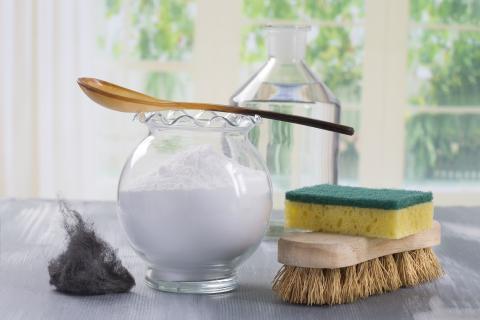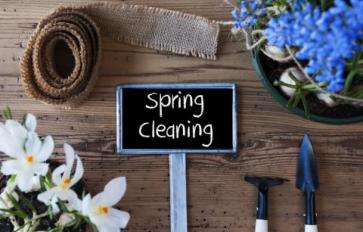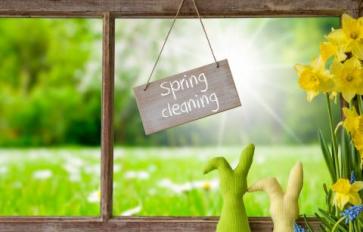
Cleaning your bathroom, with all its grout, gunk, and stains need not be a harsh chemical affair. Try these organic cleaners that are gentle on your hands and on the environment too…
When you buy those instant-shine claiming toilet or tile cleaners, you are basically polluting everything around you with toxic and harmful chemicals. The strong acids and chemicals in these cleaning solutions are not just bad for your skin and your respiratory system (when you inhale the fumes) but also create havoc when they enter the water disposal system. Water treatment plans are unable to remove many of these compounds and once they reach rivers and oceans, they begin to build up, creating an imbalance in the aquatic and marine life. Plus, the aerosols and volatile compounds add to air pollution, causing smog. They are pretty terrible for your skin and your lungs as well, so for your sake and the earth’s sake, try some organic cleaners instead, especially when using them in an enclosed space like a bathroom.
Personally, I clean my bathroom some three different ways. One is my regular daily clean, and then comes a weekly rinse. And once a month (or sometimes even two months), the bathroom gets a full top-to-bottom scrub. And here are the cleaners that I use, sticking mostly to natural and non-toxic ingredients…
Note: No Vinegar On Marble Please!
Some older and more classic constructions can have marble flooring—in that case, the vinegar needs to be kept away because anything acidic will stain and spoil the marble. You can use baking soda to clean up the marble, else it’s hot water and mild detergent for you. Scrub with a brush for stubborn stains but leave the vinegar or the lemon juice be.
My Daily Bathroom Wipe
Honestly, on a daily basis, I don’t do much. It’s more like wiping the tub/shower area, floor, and sink. I use microfiber cloths since they are abrasive enough to clean but do not leave any scratches or residues on ceramic or glass. I clean my sink with a damp microfiber cloth as well, and if need be, use a few drops of vinegar mixed with hand-wash liquid to clean a little better.
My Weekly Bathroom Rinse
By the end of the week, the bathroom does need a heftier clean because of soap scum that tends to accumulate in tile grout and drains and hard water stains that mar the chrome faucets, etc. So here is what I do to clean my bathroom over the weekend.
- Polishing Mirrors & Panes: Keeping glass, mirrors and other reflective surfaces shining can be a pain, literally—especially if you have little grubby hands around. But before you reach for your favorite soapy spray that promises gleaming surfaces, try this. In a spray bottle, pour one cup white vinegar and one cup water each. Put the cap back on, seal it tight, and then shake to mix well. Spray it on the glass or mirror you want to clean and wipe off with a microfiber cloth or wadded up rolls of newspapers. Shiny clean and any irritating smells are gone too!
- Cleaning Out Soap Scum: The same vinegar/water solution will clean lightly stained or grimy tiles with water stains, counters, and cabinet fronts, as well as pesky soap scum in the shower or tub as well. Just spray and let sit for a little while before wiping away with a microfiber cloth. Scrub with a sponge if needed.
- Tougher Stains: If the dirt or water spots are proving to be a little too stubborn for vinegar, switch to baking soda. Dip a damp sponge in a little baking soda and wipe down the tiles and the tubs, and even your tiled floor. For more stubborn stains, scour the surface with baking soda and a brush.
- Cleaning Up Stinky Toilets: Sprinkle baking soda in the toilet bowl, in a way that the sides get coated as well. Now add a few drops of your favorite essential oil to a cup of vinegar and pour well, getting it on all sides. Use a toilet brush to clean as you would, and flush after five minutes for a shiny and beautiful smelling bathroom!
- Making the Chrome Shine: Spray the 50/50 vinegar and water solution on your taps and faucets, and then wipe and buff with an absorbent towel.
My Monthly Bathroom Scrub
Depending on how diligent I was in doing my weekly bathroom rinse, I need a full bathroom scrub once every 30 to 60 days. And this is how I do with organic cleaners. The first step is to empty out the whole bathroom first, and that means getting everything off the shelves and caddies too.
- Cleaning Up Cloudy Caddies: You give your mirror a thorough wipe down, and while you do, the same 50/50 vinegar and water spray can help you clean up those bathroom caddies and shelves, which have yellowed or clouded with time. Spray the vinegar solution on the shelves and let it sit for 15-20 minutes. Now use a damp microfiber cloth and watch it all gleam.
- The Gunk In The Shower And Tub: Soap, water, and oil together often mean gunk sticks to your bathroom nooks, crannies, and grout. To get rid of it, spray full strength vinegar on the surfaces you want to clean. Immediately start to scour and clean with a sponge or brush dipped in baking soda.
- Hard To Remove Stubborn Spots: Sometimes the gunk and scum in the bathroom, coupled with hard water stains can make cleaning a pain. But before you give up and reach for an industrial-strength cleaner, try another alternative. First, spray your stains with full strength vinegar. Then in a bowl, add 1 cup baking soda and a half cup liquid dishwasher soap. Mix till you get a paste, and scour the surface and stains with a brush dipped into this cleaning paste. After you scrub, let it sit for 10-15 minutes before you wash off with water, and wipe clean.
- For A Clean Toilet: As you clean your toilet, as shown in the weekly rinse, extend the baking soda, vinegar, and essential oil treatment to the seat and the outside of your bowl as well. This will clean the bowl of any lingering pee smells, especially if you have little ones who end up sprinkling when they tinkle.
- Cleaning Clogged Drains: Forget the chemical drain cleaners. To clean up a clogged drain, or simply to let a drain remain free-flowing, sprinkle a half cup of baking soda on it, and then pour in a half cup of vinegar. Once the fizzing dies down, pour a liter of hot water in the drain. Repeat if needed on a weekly basis, though once in 2-3 months should be enough.
- For Clogged Shower Heads and Faucets: If your shower heads and faucets are not delivering the right spray, it’s time for them to take a dunk! In a clear and leak-proof plastic bag, pour in white vinegar. Now put the bag over the showerhead r faucet so that it remains immersed in the vinegar and seal the deal with a rubber band. Leave this bag on overnight and your morning shower is sure to have a good, strong spray.
Bonus: Antibacterial All-Purpose Spray For Bathrooms (& Kitchens)
In a bowl, mix 1 cup white vinegar, 2 cups water, 1 tablespoon dishwashing liquid, and 10-15 drops of your favorite essential oil (lemon, lemongrass, verbena, and anything citrusy work best). Pour the mixture into a spray bottle and use in the bathroom and kitchen to clean anything—sinks, countertops, cabinet doors, tiles, faucets, etc. Just spray and wipe with a microfiber cloth.
Bonus: All-Natural Air Freshener
In a spray bottle, pour in 1-and-a-half cups water and a half cup vinegar. Add in 15-20 drops of your favorite essential oil, and then screw the cap back and shake well before you spray in the bathroom, or in any room of your choice. The area will smell fresh with a gentle and lingering fragrance.
We hope both you and your bathroom will benefit from the use of organic cleaners. Because Mother Nature definitely would! If you have any organic hacks up your rolled-up sleeve, let us have it in the comments section below. And while you are cleaning that bathroom, get some bathroom-friendly plants in too, to add some green to your life!








